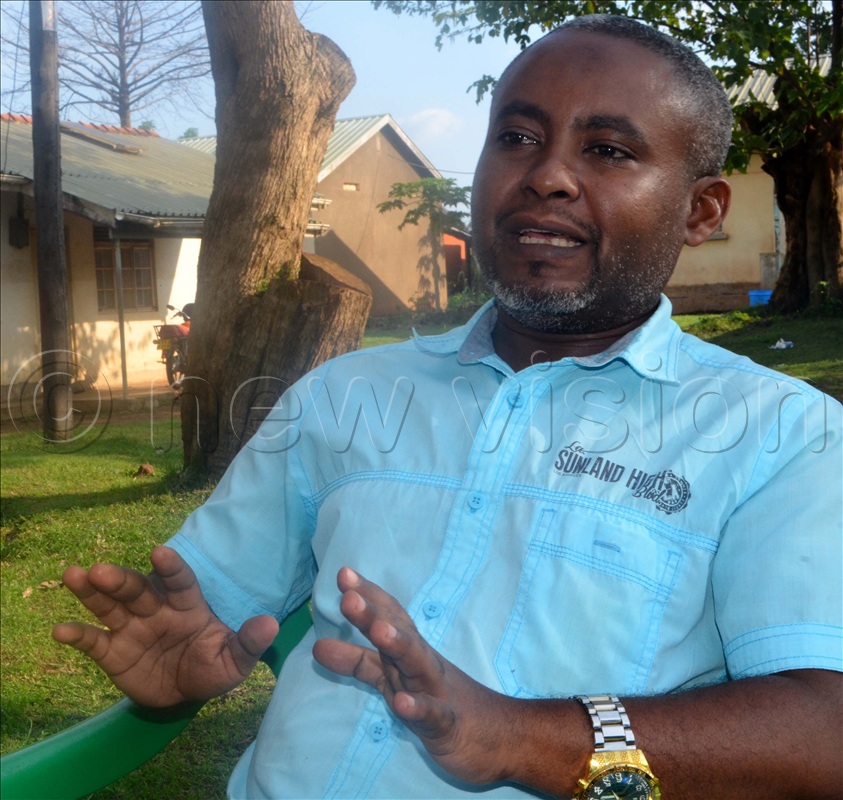Post-school poverty, overwork blamed for rising mental-health conditions among health workers
Speaking on 19th September, Ali Ismail Sharif, a medical clinical officer and assistant in charge of the facility, confirmed that depression among health workers is a serious concern.
Robert Mutumba Musenze the Acting District Health Officer Bugiri district interacts with Alice Kanyunyuzi mental Health supervisor and Sylvia Nakisita from Strongminds. (Photos by Violet Nabatanzi)
________________
When Julius Okoth, a clinical officer, reported for duty at Buyinja Health Centre (HC) IV in Namayingo district, he brought with him not only medical expertise but also a silent struggle with depression, a mental health condition characterised by persistent sadness and disruptions in sleep, appetite, and daily functioning.
“As health workers, it’s difficult to openly admit that you are struggling with mental illness,” Okoth said.
“People believe medics don’t get sick mentally. They think because we provide counselling to others, we can counsel ourselves."
The roots of his depression
Okoth traces his struggles back to what he calls post-school poverty.
“After school, parents tell you, ‘We are done with you, now go and hustle.’ But hustles are not easy,” he recalled.
Ali Ismail Sharif, a medical clinical officer and assistant in charge of Buyinja Health Centre IV speaking. 
“You try private jobs, some don’t pay you. You keep trying, and when your dreams are not realised, the stress builds. That poverty, that hopelessness, is what pushed me into depression.”
It was not until StrongMinds, a mental health organisation, reached out to him that he realised the extent of his depression.
Through counselling sessions, he started to understand the weight he had been carrying and finally felt some relief. The organisation provides free, community-based group talk therapy (Interpersonal Group Therapy, or IPT-G) to treat depression in women and adolescents in sub-Saharan Africa.
Giving back to others
Now a beneficiary, Okoth helps others at the facility’s Youth-Friendly Corner, which meets every Thursday.
“Some of the youths who come here live in ghettos, on the streets, or came hoping to strike gold but failed,” he explained.
“They turn to alcohol, get into trouble with police, or lose confidence to face their families. Through our sessions, we talk to them, support them, and sometimes even reunite them with their parents."
Okoth also noted that many health workers themselves are silently battling depression.
“People say health workers are rude, but many are simply exhausted and stressed,” he said. “Imagine working night shifts for four days straight. The community expects us to always smile and serve, but inside, some of us are struggling more than the patients we treat,” he said.
Drug abuse among health workers
Speaking on 19th September, Ali Ismail Sharif, a medical clinical officer and assistant in charge of the facility, confirmed that depression among health workers is a serious concern.
“We have had cases of health workers abusing drugs, particularly Pethidine, which eventually led to depression,” Sharif revealed. “Two of our staff members went down that path. One lost her job, but the other was referred to Butabika National Referral Hospital and is now improving.”
Rising cases of mental illness in Namayingo
Sharif said, “Our mental health clinic attends to about 120 patients, adding that the real number is much higher because many people remain outside the system.
He said the recent gold rush in the district has worsened the situation. “People are flooding in from all over the country, bringing crime, drug abuse, and social disorder,” he added.
“All these contribute to depression and other mental health challenges.”
He added that Gender-Based Violence (GBV) is another driver. “We see many girls who have been defiled or sexually harassed. They develop post-traumatic stress disorder (PTSD). The GBV cases are fueling depression among young women,” he noted.
Shortage of supplies
Despite the growing demand, the facility struggles to meet mental health needs. “Our supplies come from the National Medical Stores (NMS), but they are not enough,” Sharif explained.
The facility conducts quarterly outreaches through the Primary Health Care budget to reach more people in the community. But still, challenges remain.
“Buyinja Health Centre IV is the highest level of health care in the district. With the large patient numbers, we cannot even screen everyone for mental health during outpatient visits. Many people come with mental health issues and leave without being identified.”
Bulambuli district
Bulambuli acting district health officer (DHO) Martin Naimu revealed that cases of depression are on the rise in the district, largely driven by disaster-related experiences. The heavy rainfalls which happened in November last year led to landslides that killed and displaced people.
He noted that families displaced by landslides are bearing the heaviest psychological burden. “When survivors shared their stories while in a health facility, you could clearly see the trauma they were going through,” Naimu said. He added that even after the government directed their relocation to camps, many continued to exhibit signs of depression.
Bugiri district
Robert Mutumba Musenze, the acting district health officer Bugiri district, said as a district, they have integrated mental illness within the continuum of service delivery in the district, especially at HCs III, IV and the hospital, because at least there we have psychiatric nurses, medical officers, but also they have para social workers and Village health Teams (VHTs), especially at the village level.
He added that they also partner with the partners who are dealing with mental illness.
Joel Omoding, the Mbale district programme co-ordinator Strongminds Uganda said ever since they started working in Mbale in 2020, they have been able to treat several thousands of people, including adolescents with depression in Mbale district.